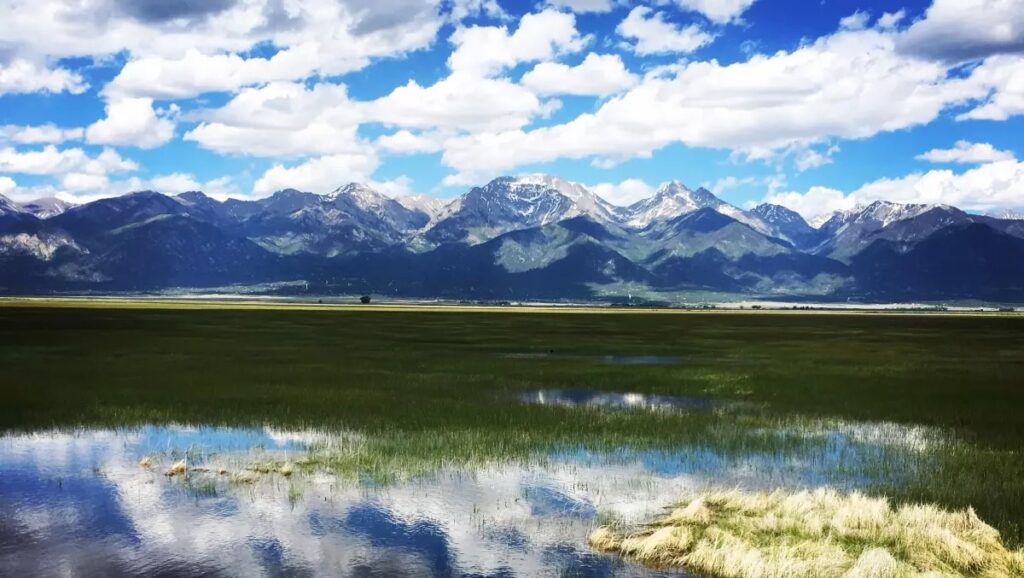Standing on the yucca and mesquite dotted landscape and with an unobstructed view of the majestic Sangre de Cristo mountains, there is a sense of near total isolation. The ever-moving shadow of deep blue mountains and low-hanging clouds, the lonely bristle of the winds and the steady flow of the waters that nourish both plant and wildlife in the valley are sometimes the only movement across these plains. But the sounds of elk bugling or light-footed hoofbeats of pronghorn ante- lope can break the silence. This feather-like cacophony makes the Baca National Wildlife Refuge seem almost more than idyllic.

The Refuge, one of the San Luis Valley’s isolated though accessible open spaces is both beautiful and sacred, said Ty Benally, Refuge Manager. Under the azure sky of the valley and framed by the mountains, the land has been the ancestral home of the Cheyenne, Jicarilla Apache, Kiowa, Navajo and Pueblo tribes. To introduce visitors to this gem of the Valley, the U.S. Fish and Wildlife Service has planned an open house for the refuge for May 13th, 2024.
Bennaly has seen much of the refuge and each time says it gives him a “special feeling.” “I appreciate every day where I’m at. This place gives me a mission.” He hopes when visitors come this summer, they can find the same level of serenity that he has found.
The refuge is approximately 30 miles from Alamosa on the west side of the Sangre de Cristo Range. Visitors can take state highway 17 and County T Road to the refuge gates which opens at 8:45 a.m. At 9:00 a.m. Friends of the San Luis Valley National Wildlife Refuge Complex will greet them and answer any questions they may have. Visitors are asked to comply with the 15-mph speed limit to ensure the safety of the prairie dog colonies that dot either side of the road.
The refuge, said Benally, has been blessed with an abundance of water this season thanks to a heavier than normal snowpack. The snowpack has turned an endless, pale shade of green into a verdant and colorful panorama. “It never ceases to amaze me,” he said, of the refuge’s natural beauty. “The rainbow days, the foggy days with the cotton- wood trees back, I’m lucky to live in a mini-paradise.”
The refuge is 90,000-acre of heaven for birders with kestrel, great horned owl, northern flicker, robin, yellow warbler and Bullock’s oriole all regular inhabitants. The rich supply of food and water also make it a comfortable nesting or visit for waterfowl like mallard, pintail, teal, Canada geese, avocet, killdeer, white-faced ibis, egret and heron.
While the open house for the refuge is scheduled for May 13th, no official opening day for full visits has yet been set. Benally is hoping that the Open House might inspire a handful of visitors to volunteer to staff the refuge as the season progresses. He said they’ll be needed for tours of the historical ranch facilities, which includes historic cabins and ranch offices.
The refuge is rich in history, beginning with its appellation, Baca. The earliest records of the name go back to 1823 when Luis Maria Cabeza de Baca and his sons—nineteen—were awarded a grant by the Mexican government. Mexico regularly used grants to ensure both settlements and development. After the U.S. resumed ownership of the land, 28 other families or individuals also claimed ownership. There have also been skirmishes on parts of the land between Native Americans tribes as well as between Native Americans and White settlers.
With conflict behind and history respected, the lands today are periodically open for hunting as well as agriculture and mining. But its history and unparalleled beauty are what make it one of Colorado’s and the country’s fascinating and pristine best kept secrets.




